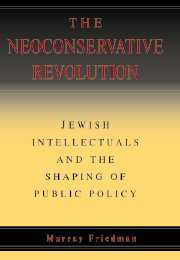Book contents
- Frontmatter
- Contents
- Introduction: American Jews in an Age of Conservatism
- 1 Jews and the Making of the Cosmopolitan Culture
- 2 The Premature Jewish Neoconservatives
- 3 Forgotten Jewish Godfathers
- 4 The Liberal Civil War
- 5 The Modernization of American Conservatism
- 6 The Liberal Meltdown
- 7 The Rise of the Neoconservatives
- 8 Neoconservatives and the Reagan Revolution
- 9 Nicaragua: The Cold War Comes to This Hemisphere
- 10 Irving Kristol and a New Vision of Capitalism
- 11 The Neoconservative Assault on the Counterculture
- 12 Jews and the Christian Right
- 13 Epilogue
- Notes
- Index
11 - The Neoconservative Assault on the Counterculture
Published online by Cambridge University Press: 05 June 2012
- Frontmatter
- Contents
- Introduction: American Jews in an Age of Conservatism
- 1 Jews and the Making of the Cosmopolitan Culture
- 2 The Premature Jewish Neoconservatives
- 3 Forgotten Jewish Godfathers
- 4 The Liberal Civil War
- 5 The Modernization of American Conservatism
- 6 The Liberal Meltdown
- 7 The Rise of the Neoconservatives
- 8 Neoconservatives and the Reagan Revolution
- 9 Nicaragua: The Cold War Comes to This Hemisphere
- 10 Irving Kristol and a New Vision of Capitalism
- 11 The Neoconservative Assault on the Counterculture
- 12 Jews and the Christian Right
- 13 Epilogue
- Notes
- Index
Summary
Neoconservatives viewed the collapse of the Soviet Union as their ultimate victory. A neoconservative ally, Francis Fukuyama, described the event as the “end of history.” Midge Decter, seeing no further need for the Committee for the Free World, shut it down. Even as neocons celebrated, however, many remained uneasy. The counterculture, they felt, had become institutionalized on college campuses, in many sectors of the media, and in the politics of the nation. Writing in The National Interest in 1993, not long after Bill Clinton won election, Irving Kristol declared,
There is no ‘after the Cold War’ for me. So far from having ended, my Cold War has increased in intensity, as sector after sector has been ruthlessly corrupted by the liberal ethos. Now that the other Cold War is over, the real Cold War has begun. We are far less prepared for this Cold War, far more vulnerable to the enemy, than was the case with our victorious war against a global Communist threat.
Success in the Cold War, in short, had little meaning for neocons if the broader culture continued to spin out of control. It was less that the old rules and values were ignored or flouted than that the newer ethos seemed to suggest that there were no rules. Morality was simply a matter of individual choice, and moral relativism had become the new norm.
The counterculture sought acceptance for what neocons and many ordinary Americans considered to be bizarre ideas and behavior.
- Type
- Chapter
- Information
- The Neoconservative RevolutionJewish Intellectuals and the Shaping of Public Policy, pp. 185 - 204Publisher: Cambridge University PressPrint publication year: 2005



